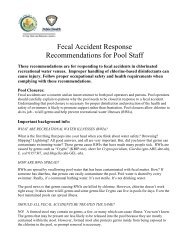Chlamydia
Chlamydia
Chlamydia
You also want an ePaper? Increase the reach of your titles
YUMPU automatically turns print PDFs into web optimized ePapers that Google loves.
<strong>Chlamydia</strong><br />
What is <strong>Chlamydia</strong>? <strong>Chlamydia</strong> is the most commonly reported STD. It is caused by a<br />
bacteria, which can infect the vagina, cervix, rectum, penis, urethra or throat. <strong>Chlamydia</strong><br />
can be easily cured, but because it usually has no signs or symptoms, many people don’t<br />
realize they are infected.<br />
How many people get <strong>Chlamydia</strong>?<br />
In the United States, about 3 million people are infected with <strong>Chlamydia</strong> each year.<br />
<strong>Chlamydia</strong> is most common in people under 25 years of age. Because the cervix is not<br />
fully developed, young women are at higher risk of getting <strong>Chlamydia</strong> than young men.<br />
How is <strong>Chlamydia</strong> transmitted? <strong>Chlamydia</strong> is spread through unprotected vaginal<br />
and anal sex with an infected partner – even if that person has no symptoms.<br />
Ejaculation does not have to happen to get <strong>Chlamydia</strong>. The risk from oral sex is lower. It<br />
can also be passed from mother to baby during birth.<br />
What are the symptoms? Most women and many men never notice symptoms. If<br />
symptoms occur, they usually show up 1 - 3 weeks after infection. The most common<br />
symptoms are:<br />
Women<br />
• Abnormal vaginal discharge.<br />
• Pain or burning while urinating.<br />
• Bleeding between periods or after sex.<br />
• Pain during sex.<br />
• Stomach pain.<br />
Men<br />
• Discharge from penis.<br />
• Itching inside penis.<br />
• Pain or burning while urinating.<br />
• Painful, swollen testicle.<br />
If <strong>Chlamydia</strong> is in the rectum, there may be few or no symptoms. Some people feel<br />
itching or pain in the rectum.<br />
What happens if I have <strong>Chlamydia</strong>? <strong>Chlamydia</strong> infection makes it easier to get<br />
HIV and other STDs and to pass them to sex partners. Without treatment, <strong>Chlamydia</strong><br />
may spread inside the body. There, it can cause pelvic inflammatory disease (PID) in<br />
women and epidydimitis in men, two very serious illnesses.<br />
• Pelvic Inflammatory Disease (PID) can develop if gonorrhea spreads to the<br />
uterus and fallopian tubes. PID can result in chronic pelvic pain, infertility, or<br />
tubal pregnancy (pregnancy outside the uterus). Symptoms of PID include pain<br />
in the lower abdomen or back, fever, spotting or bleeding between menstrual
periods, pain during sex, and increased vaginal discharge.<br />
• Epidydimitis results when untreated infections in men spread into the testicles.<br />
This leads to pain or swelling in the scrotal area, which is a sign of inflammation<br />
of a part of the testicle called the epididymis. Epididymitis is often painful and, if<br />
it involves both testicles, can lead to infertility.<br />
If <strong>Chlamydia</strong> gets into the eyes, it can cause an eye infection called conjunctivitis (pink<br />
eye).<br />
How do I avoid getting <strong>Chlamydia</strong>? The only sure way to avoid <strong>Chlamydia</strong> and<br />
other STDs is to not have sex (abstinence). If you do have sex:<br />
• Talk with your partner(s) about <strong>Chlamydia</strong> and other STDs. Work out a plan to<br />
reduce risks that both can agree on.<br />
• Use male or female condoms the right way and every time you have sex.<br />
• Don’t have sex if you notice any unusual discharge from your partner’s penis,<br />
vagina, or anus.<br />
• Have sex with only one partner who has sex only with you (mutual monogamy).<br />
• Have sex with fewer people. More partners = more risk.<br />
No method of birth control, except condoms, protects you against any STD. If you think<br />
you might have <strong>Chlamydia</strong> (or any STD), seek care at a local health care provider or<br />
clinic. If you have <strong>Chlamydia</strong>, tell all of your sex partners so they can get treated too.<br />
How do I find out if I have <strong>Chlamydia</strong>? The only way to be sure is to get tested.<br />
The test is easy – either a urine sample or a fluid sample from the penis, vagina, cervix,<br />
or rectum is taken and sent to a lab. Many healthcare providers do not test for<br />
<strong>Chlamydia</strong> unless you ask. Getting a pap smear doesn’t mean you have been tested for<br />
<strong>Chlamydia</strong> or any other STD.<br />
How is <strong>Chlamydia</strong> treated? <strong>Chlamydia</strong> can be easily treated with antibiotics.<br />
Because <strong>Chlamydia</strong> and gonorrhea often occur together, people with <strong>Chlamydia</strong> may be<br />
treated for both diseases at the same time. Not all antibiotics work against <strong>Chlamydia</strong>,<br />
so your provider will suggest the best one for you.<br />
Important information about treatment<br />
• Take all of the medicine prescribed, even if symptoms go away.<br />
• Never treat yourself with old, leftover antibiotics or other pills from home.<br />
• Do not split your own medication with your partners. Some health care providers<br />
will give extra medication to take home to your partners.<br />
• Make sure your sex partners get treated too so you don’t get infected again.<br />
• Don’t douche or use an enema.<br />
• Don’t have sex until your provider says you and your partner(s) are cured.
You should not have sex for 7 days after treatment. Recent or regular sex partners must<br />
also be treated before having sex again or they may re-infect each other. Everyone<br />
should get tested again 3 months after treatment to be sure they have not been reinfected<br />
since treatment.<br />
How does <strong>Chlamydia</strong> affect pregnancy? <strong>Chlamydia</strong> can cause a pregnant woman<br />
to go into labor early or deliver a low-birthweight baby. <strong>Chlamydia</strong> can spread from<br />
mother to baby during birth. This can cause pneumonia or a serious infection in the<br />
baby’s eye that may lead to blindness. A pregnant woman can be treated to prevent<br />
transmission to the baby. All pregnant women should be tested for <strong>Chlamydia</strong>, even if<br />
they don’t seem to be at risk.<br />
For more help<br />
• Washington State HIV/HEPC/STD hotline: (800) 272-AIDS (2437) - Testing and<br />
treatment resources and information.<br />
• ASHA STI Resource Center: (919) 361-8488 - STI/STD information.<br />
• Centers for Disease Control National STD/HIV Hotlline: (800) CDC-INFO (1-800-<br />
232-4636) Spanish (800) 344-7432, TTY (800) 243-7889 - General information on<br />
many health topics including STDs and HIV.<br />
More information<br />
• American Social Health Association <strong>Chlamydia</strong> information<br />
• <strong>Chlamydia</strong> fact sheet (Centers for Disease Control)<br />
• <strong>Chlamydia</strong> information (Planned Parenthood)















